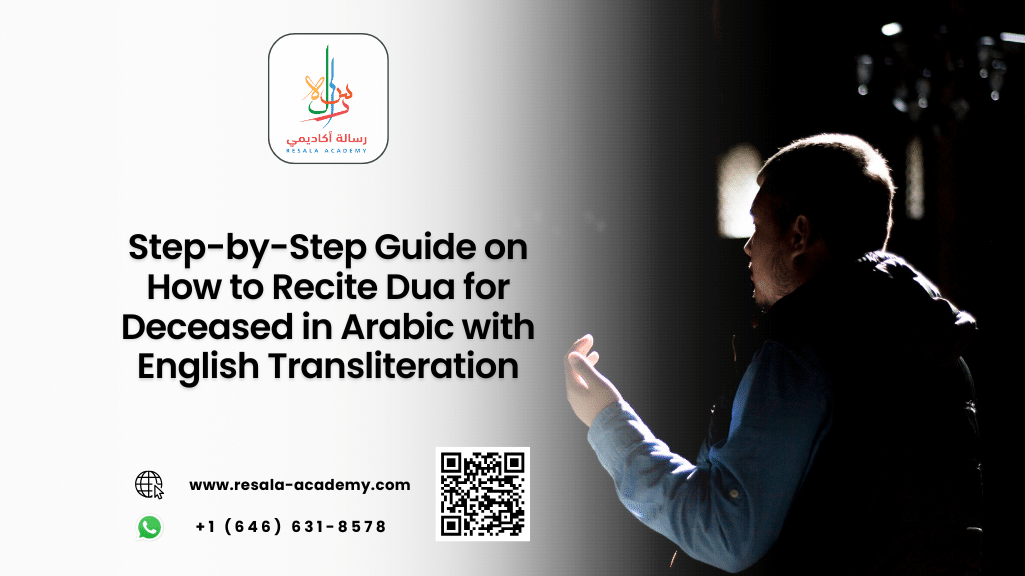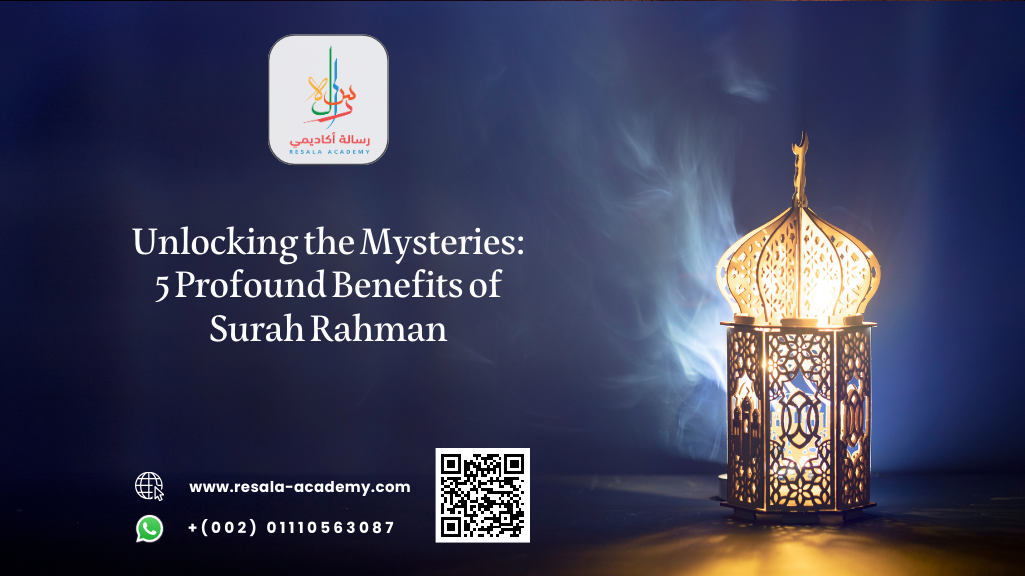Table of Contents
Step-by-Step Guide on How to Recite Dua for Deceased in Arabic with English Transliteration
Losing a loved one is one of the most profound experiences in life. In Islam, one of the most compassionate acts we can perform for the departed is to make sincere supplication—known as a dua for deceased. This act not only brings comfort to the living but also benefits the soul of the departed in the hereafter.
This comprehensive guide is tailored specifically for non-native Arabic speakers who wish to learn how to recite the dua for the deceased in Arabic, understand its meaning, and connect with its spiritual depth. With the help of Resala Academy, a premier online institution offering Arabic and Quran classes, you can master the art of supplication and deepen your Islamic knowledge.
What is Dua for Deceased?
In Islam, a dua for deceased is a heartfelt prayer made to Allah ﷻ asking for mercy, forgiveness, and peace for someone who has passed away. It is one of the most beneficial gifts we can offer to our loved ones after their death.
The Prophet Muhammad ﷺ emphasized the importance of praying for the deceased:
إِذَا مَاتَ الإِنْسَانُ انْقَطَعَ عَنْهُ عَمَلُهُ إِلاَّ مِنْ ثَلاَثَةٍ إِلاَّ مِنْ صَدَقَةٍ جَارِيَةٍ أَوْ عِلْمٍ يُنْتَفَعُ بِهِ أَوْ وَلَدٍ صَالِحٍ يَدْعُو لَهُ
“When a person dies, all his deeds come to an end except three: ongoing charity, beneficial knowledge, or a righteous child who prays for him.”
— Sahih Muslim 1631
This hadith highlights how a dua for the deceased can continue to benefit them even after death.
Importance of Making Dua for the Deceased
Making dua for a deceased person is a noble act that holds immense spiritual value. Here’s why it matters:
- It brings peace and mercy to the soul of the deceased.
- It fulfills the Sunnah of Prophet Muhammad ﷺ.
- It connects the living with the dead through spiritual remembrance.
- It serves as a reminder of our own mortality and the hereafter.
Read more about: Dua for Studying in Arabic with English Transliteration and Meaning for Non-Native Speakers
Step-by-Step Guide: How to Recite Dua for Deceased in Arabic with English Transliteration
Learning how to correctly recite the dua for deceased in Arabic can seem daunting for non-native speakers. But with structured guidance and transliteration, it becomes accessible and meaningful.
Step 1: Begin with Praise and Salawat
Start by praising Allah and sending blessings upon the Prophet ﷺ.
Arabic:
اللَّهُمَّ صَلِّ عَلَىٰ مُحَمَّدٍ وَعَلَىٰ آلِ مُحَمَّدٍ
Transliteration:
Allahumma salli ‘ala Muhammad wa ‘ala aali Muhammad
Translation:
O Allah, send blessings upon Muhammad and upon the family of Muhammad.
This sets a respectful tone and aligns your supplication with the Sunnah.
Step 2: Recite the Core Dua for Deceased
Here is one of the most authentic and widely recited duas for the deceased:
Arabic:
اللَّهُمَّ اغْفِرْ لَهُ وَارْحَمْهُ، وَعَافِهِ وَاعْفُ عَنْهُ، وَأَكْرِمْ نُزُلَهُ، وَوَسِّعْ مُدْخَلَهُ، وَاغْسِلْهُ بِالْمَاءِ وَالثَّلْجِ وَالْبَرَدِ، وَنَقِّهِ مِنَ الْخَطَايَا كَمَا يُنَقَّى الثَّوْبُ الْأَبْيَضُ مِنَ الدَّنَسِ، وَأَبْدِلْهُ دَارًا خَيْرًا مِنْ دَارِهِ، وَأَهْلًا خَيْرًا مِنْ أَهْلِهِ، وَزَوْجًا خَيْرًا مِنْ زَوْجِهِ، وَأَدْخِلْهُ الْجَنَّةَ، وَأَعِذْهُ مِنْ عَذَابِ الْقَبْرِ وَمِنْ عَذَابِ النَّارِ
Transliteration:
Allahumma ighfir lahu warhamhu, wa ‘aafihi wa’fu ‘anhu, wa akrim nuzulahu, wa wassi’ mudkhalahu, waghsilhu bil maa’i wath-thalji wal barad, wanaqqihi minal khataya kama yunaqqa ath-thawbu al-abyadu min ad-danas, wa abdilhu daran khayran min darihi, wa ahlan khayran min ahlihi, wa zawjan khayran min zawjihi, wa adkhilhul jannah, wa a’idhhu min ‘adhabil qabri wa ‘adhabin naar.
Translation:
” O Allah! forgive him, have mercy upon him, give him peace and absolve him. Receive him with honour and make his grave spacious; wash him with water, snow and hail. Cleanse him from faults as Thou wouldst cleanse a white garment from impurity. Requite him with an abode more excellent than his abode, with a family better than his family, and with a mate better than his mate. Admit him to the Garden, and protect him from the torment of the grave and the torment of the Fire.”
This dua is from a well-known hadith in Sahih Muslim 963.
Step 3: Personalize the Supplication
You can personalize the dua for the deceased by mentioning the name of the person:
Example:
اللَّهُمَّ اغْفِرْ لِـ[اسم المتوفى] وَارْحَمْهُ
Transliteration:
Allahumma ighfir li [Name] warhamhu
Translation:
O Allah, forgive [Name] and have mercy on him.
Step 4: End with General Prayers for All Deceased Muslims
Arabic:
اللَّهُمَّ اغْفِرْ لِحَيِّنَا وَمَيِّتِنَا، وَشَاهِدِنَا وَغَائِبِنَا، وَصَغِيرِنَا وَكَبِيرِنَا، وَذَكَرِنَا وَأُنْثَانَا
Transliteration:
Allahumma ighfir li hayyina wa mayyitina, wa shahidina wa gha’ibina, wa sagheerina wa kabeerina, wa dhakarina wa unthana
Translation:
O Allah, forgive our living and our dead, those present and those absent, our young and our old, our males and our females.
This inclusive prayer reflects the communal nature of Islam and the collective responsibility of remembrance.
Tips for Non-Native Speakers Learning Dua in Arabic
Learning Arabic duas can be challenging, but with the right approach, it becomes a rewarding spiritual journey.
Practical Tips:
- Practice daily with transliteration and audio support.
- Enroll in structured Arabic classes like those at Resala Academy.
- Use voice repetition tools to improve pronunciation.
- Keep a dua journal to track progress and memorize new prayers.
- Join online study groups for motivation and support.
The Importance of Dua for Deceased in Islamic Funeral Rites
In Islamic funeral rites, the dua for deceased plays a pivotal role, serving as both a spiritual farewell and a plea for divine mercy. It is not merely a ritualistic utterance but a profound act of worship that reflects the Islamic worldview of life, death, and the hereafter.
Core Element of Janazah Prayer: The funeral (Janazah) prayer is unique in Islam as it contains no ruku or sujood—its essence lies in the supplication. The heart of this prayer is the dua for the deceased in Arabic, where the congregation collectively asks Allah for forgiveness and mercy for the departed soul.
Spiritual Intercession: According to authentic Hadith, the prayer of a righteous Muslim can serve as intercession for the deceased. This makes the dua for a deceased not only a form of remembrance but a means of potentially altering the soul’s condition in the grave.
Fulfillment of Communal Obligation (Fard Kifayah): Attending the funeral and making dua for the deceased is a communal obligation. If a sufficient number of Muslims perform it, the entire community is absolved; if not, the community bears the sin collectively.
Symbol of Unity and Mercy: During the funeral rites, Muslims of all backgrounds unite in prayer, reciting the dua for deceased in Arabic, which emphasizes the universal nature of Islamic brotherhood and the shared hope for divine mercy.
Echo of the Prophet’s Sunnah: The Prophet Muhammad ﷺ himself would pause during funerals to make heartfelt duas for the dead, setting a precedent that underscores the spiritual gravity of this act in Islamic tradition.
How Dua for the Deceased Strengthens the Bond Between the Living and the Dead
The act of making dua for deceased individuals is not only a benefit to the departed but also a transformative experience for those who remain. It fosters a deep spiritual connection that transcends the physical realm.
Perpetual Charity Through Prayer: When a person makes a dua for a deceased, it is considered a form of ongoing charity (sadaqah jariyah) if done with sincerity. This aligns with the hadith that mentions a righteous child’s prayer as a lasting benefit for their parents.
Cultivating Spiritual Mindfulness: Regularly making dua for the deceased in Arabic encourages believers to reflect on their own mortality, inspiring them to lead more righteous lives in preparation for their own return to Allah.
Preserving the Legacy of the Righteous: By remembering and praying for scholars, martyrs, and loved ones, Muslims keep alive the spiritual legacy of those who came before them, reinforcing the importance of knowledge, piety, and community.
Encouraging Intergenerational Piety: Teaching children to recite the dua for deceased in Arabic instills a sense of responsibility and love for their elders, ensuring that the tradition of remembrance continues across generations.
Strengthening Faith Through Language: Learning to recite the dua for the deceased in Arabic with proper pronunciation and understanding deepens one’s connection to the Quranic language, enhancing both linguistic and spiritual fluency—a goal that platforms like Resala Academy are dedicated to helping students achieve.
Resala Academy: Your Gateway to Mastering Arabic & Quranic Duas
If you’re a non-native speaker eager to learn Arabic, understand the Quran, and master Islamic supplications like the dua for deceased, Resala Academy’s Islamic Studies Online Course is your ideal learning partner.
Why Choose Resala Academy?
📚 Expert native Arabic instructors
🕋 Specialized courses in Quranic Arabic and Islamic studies
💻 Flexible online classes tailored for all levels
🎧 Interactive lessons with audio-visual aids
🌍 Global community of learners
Whether you’re starting from scratch or looking to deepen your knowledge, Resala Academy provides the tools, resources, and support you need to succeed.
👉 Join Resala Academy today and begin your journey toward spiritual fluency and heartfelt worship.
Frequently Asked Questions (FAQs)
1. What is the best time to recite dua for the deceased?
You can make dua for the deceased at any time, but some of the most recommended times include:
- After obligatory prayers
- During the last third of the night
- On Fridays
- During Janazah (funeral) prayers
- While visiting graves
These times are spiritually significant and increase the likelihood of your supplication being accepted.
2. Can women recite dua for deceased at the graveyard?
Yes, women can recite dua for deceased at the graveyard. While there are differing opinions on women visiting graves, making dua is permissible and encouraged regardless of location.
3. Is it necessary to recite dua in Arabic?
While Arabic is the language of the Quran and Sunnah, it is not mandatory to make dua in Arabic. However, learning the Arabic version enhances your connection with the original texts. Institutions like Resala Academy can help you learn Arabic effectively.
4. How can I teach my children to make dua for the deceased?
Start by:
- Teaching them short, easy duas with transliteration
- Explaining the meaning and importance of each supplication
- Encouraging them to pray for grandparents or relatives
- Enrolling them in child-friendly Arabic programs like those at Resala Academy
Summary
Reciting a dua for deceased is a beautiful, compassionate act that transcends language and borders. Whether you’re a beginner or an advanced learner, understanding and practicing these prayers in Arabic brings you closer to your faith and the loved ones you’ve lost.
With the support of Resala Academy, mastering these duas becomes not just possible, but deeply enriching. Their expert-led courses empower non-native speakers to learn Arabic, understand the Quran, and embrace the beauty of Islamic supplication.
Let your words become a bridge between hearts and heavens. Let your duas echo through eternity. May Allah grant your loved ones Jannah and accept your sincere prayers. Ameen.




